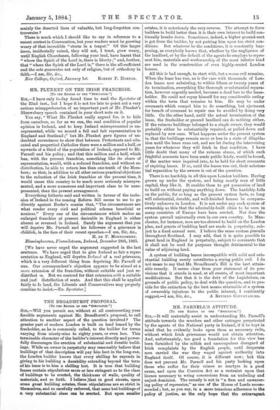THE BROADHITRST PROPOSAL.
[To THE EDITOR or TER "SPECTATOR."]
Sin,—Will you permit me, without at all controverting your forcible arguments against Mr. Broadhurst's proposal, to call attention to another aspect of the question involved P The greater part of modern London is built on land leased by the freeholder, as he is commonly called, to the builder for terms varying from ninety-nine to eighty years, or even less. This terminable character of the builder's interest directly and power- fully discourages the erection of substantial and durable build- ings. While an owner in perpetuity may reasonably believe that buildings of that description will pay him best in the long-run, the London builder knows that every shilling he expends in giving to his building a durability extending beyond the term of his lease is to him a shilling lost. It is true that building leases contain stipulations more or less stringent as to the class of buildings to be erected, the thickness of walls, quality of materials, and so forth. I believe :that in good streets, upon some great building estates, these stipulations are so strict in themselves, and so carefully enforced, that none but buildings of a very substantial class can be erected. But upon smaller estates, it is notoriously the very reverse. The attempt to force builders to build better than it is their own interest to build con- tinually breaks down. Sometimes, indeed, a higher ground-rent is got from the builder, by not putting him upon too strict con- ditions. But whatever be the conditions, it is constantly hap- pening, as everybody knows that, whether by the negligence of the landlord, or by the default of the agents he employs to repre- sent him, materials and workmanship of the most inferior kind are used in the construction of even highly-rented London houses.
All this is bad enough, to start with, but a worse evil remains. When the lease has run, as is the case with thousands of Lon- don leases now subsisting, to within fifteen or twenty years of its termination, everything like thorough or substantial repara- tion, however urgently needed, becomes a dead loss to the lease- holder. He could not repay himself for any considerable outlay within the term that remains to him. He may be under covenant; which compel him to do something, but ejectment for breach of covenant to repair can be avoided by doing very little. On the other hand, until the actual termination of the lease, the freeholder or ground landlord can do nothing either. If the ruinous buildings belonged to a single owner, they would probably either be substantially repaired, or pulled down and replaced by new ones. What happens under the present system is, that the buildings remain more or less in a state of dilapida- tion until the lease runs out, and are let during the intervening years for whatever they will fetch in that condition. I have little doubt that many of the ruinous slums, of which such frightful accounts have been made public lately, would be found, if the matter were inquired into, to be held for short remnants of expiring leases. If so, until the leases run out, their substan- tial reparation by the owners is out of the question.
There is no hardship in all this upon London builders. Having grown up under the system, and being mostly men of little capital, they like it. It enables them to get possession, of land to build on without paying anything down. The hardship falls on the public, for so long as the present system lasts, so long will substantial, durable, and well-finished houses be compara- tively unknown in London. It is not under any such system of ownership as this that the admirably-built cities to be seen in many countries of Europe have been erected. Nor does the system prevail universally even in our own country. In Man- chester, for instance, men are too shrewd to build on the London plan, and grants of building land are made in perpetuity, sub- ject to a fixed annual rent. I believe the same custom prevails throughout Scotland. I may add, that it is quite possible to grant land in England in perpetuity, subject to covenants that it shall not be used for purposes thought detrimental to the value of adjoining land.
A system of building leases incompatible with solid and sub- stantial building surely constitutes a crying public evil. I do not mean to say that Mr. Broadhurst's Bill is the best attain- able remedy. It seems clear from your statement of its pro- visions that it stands in need, at all events, of most important modifications. But that it is the duty of the Legislature, on grounds of public policy, to deal with the question, and to pro- vide for the extinction by the best means attainable of a system of ownership injurious to the public interest, I confidently






































 Previous page
Previous page